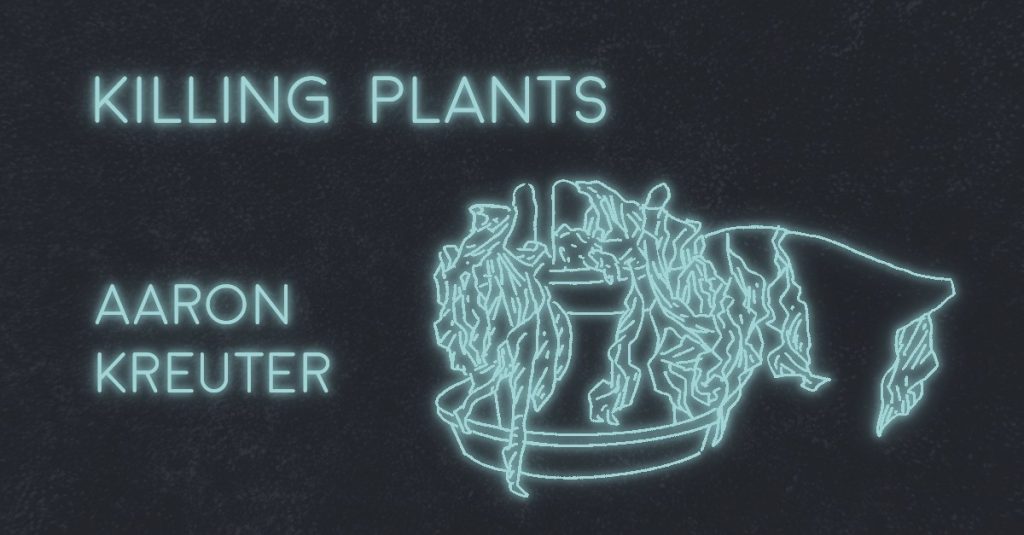It was during Fletcher’s third week at the new job that he noticed Colleen’s plant didn’t look so hot. The plant’s big green leaves were sagging, nearly touching the desk. Nobody had asked him to take care of the plant during his ten-month contract, filling in for Colleen while she was on mat leave, but the plant was obviously thirsty. Fletcher filled up his coffee mug with water and poured it into the off-white pot, the soil quickly sucking it up. Just to be safe, he tipped in a second mugful; this time, a half-inch of water remained sitting on top of the dirt. More than enough. It already seemed perkier.
When he came back after the long weekend—Saturday night spent worrying about the plant, whose health Fletcher had convinced himself would determine if he was hired on full time upon Colleen’s return—the plant was dead. It was unmistakable: the leaves were brown and crispy, there wasn’t a speck of green, not a hint of life. Fletcher panicked. A dead plant in the office did not scream collegiality. He had to get rid of it. But he couldn’t just throw it out in the office garbage—it was Colleen’s plant! The janitor would for sure notice.
He stuffed the plant into his knapsack, the leaves crunching, and took the stairs to the floor below, where he deposited it in the washroom garbage under the paper towel dispenser. Washing his hands, the peaked garbage lid still swinging on its hinges, a toilet flushed. Fletcher froze, looked up at the stall he had assumed was empty in the mirror. The door creaked open, and out came Brenda. “Fletch, how ya doing?! We were all really impressed with how you handled last week’s scheduling snafu.” She was rigorously washing her hands. At least six-five, shaved head, white shirt with a short black tie, Brenda was Fletcher’s boss.
Fletcher stood there, dumbfounded. Did she know what he had done? “You seem to be fitting in great. Keep it up!” Brenda smacked Fletcher on the back—hard—and vacated the bathroom.
Back at his desk, Fletcher couldn’t focus. There was a lot of work to do, unending work, but for the rest of the day Fletcher barely got through what normally would take him half an hour.
The plant’s absence grew in his mind like a pimple. Every night he worried that the following morning he’d be called into the board room, and Brenda and Brenda’s bosses—and even, sometimes, Colleen herself, a month-old baby latched onto her breast—would be sitting there. “Fletcher, we need to talk.” “Fletcher, we know what you did.” “Fletcher… you’re fired.” A week after he threw the plant out he went back to the washroom to see if it was still in the garbage. It wasn’t. He told himself it didn’t matter, everything was okay, it was just a plant, right?
But no matter what he did, he couldn’t shake that fucking plant. He booked an appointment at his therapist, whom he hadn’t seen in years. The therapist had grown his hair out, was drinking coffee from a large travel mug. The office reeked like greasy farts. Fletcher wasn’t perturbed; he unloaded on his therapist about the plant, the dread, the guilt, the dreams of getting fired. “How much longer can this go on?” he said to the therapist, who took a long, loud sip before launching into techniques to deal with intrusive thoughts.
Afterwards, Fletcher felt better, but that night the dream was back: the board room, the higher-ups, their knowledge of what he did to Colleen’s plant. Fletcher back in his office, packing up his scant belongings.
So went the days, the weeks, the months. Some nights, worry for the plant would fester into more generalized worries, blisters of hot searing guilt. Fletcher as a bad roommate at nineteen. Fletcher running out of his pills three weeks after society collapsed. Fletcher, a young boy, laughing when he accidentally closed the elevator door on an old man, the geezer flailing his arms and legs as the soft doors hit him repeatedly. So went the days, weeks, months, the plant by now no more than dust salting a seagull’s breakfast at some suburban landfill.
Finally, Colleen’s mat leave was over, and Fletcher was interviewed for a permanent position. The interview with Brenda was light, chatty. A breeze. Still, he couldn’t help feeling that any moment now, the ax would fall.
The day he was offered the job, in Colleen’s office with Colleen and Brenda, Fletcher told them what happened with the plant, and they all had a good laugh. “Why didn’t you just buy a new plant if you were so worried?” said Brenda, slapping her knee. “That plant was here when I got my promotion,” Colleen said, “it wasn’t even mine!” She was laughing so hard Fletcher watched milk stains blossom under her blouse.
Fletcher went back to his desk. An enormous weight had been lifted. He was free of the plant. He had a good government job with good government benefits and a good government pension. He started working with that rare elation that comes, what, three, four times in a life, if you’re lucky. As usual, He had a backlog, but he was so buoyant he didn’t care. The work would get done. The cargo would be concentrated in central, confined centers. The cargo would be packed onto trains and delivered to the processing plant. The cargo would be processed. It always was.
Fletcher looked around his office, a smile on his face.
Maybe he’d buy himself a plant.

